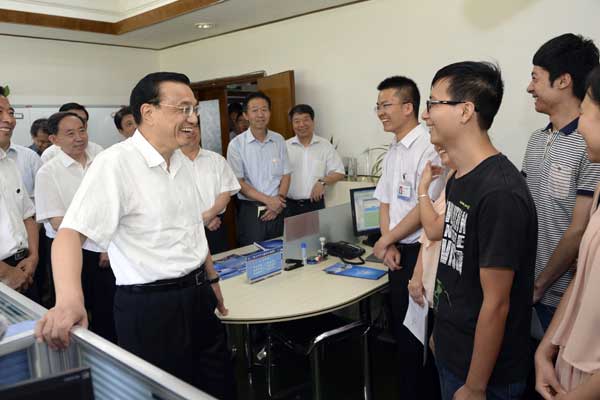Be innovative, Li tells graduates
Premier encourages students to find work in western China
Premier Li Keqiang told new graduates to be enterprising and innovative in hunting for jobs in what some say is the toughest time for them to find work in recent years.
At Lanzhou University in Gansu province on Sunday, Li assured students that the government will spare no effort in helping them succeed in the difficult job market.
 |
|
Premier Li Keqiang shares a light moment with students during his visit to Lanzhou University, Gansu province, on Sunday. The premier urges students to remain confident of the job market. [Tang Mingming / For China Daily] |
"Young people should be resolute and brave to start their own businesses. By doing so, you create jobs not only for yourselves but also for many others," Li said when he met a crowd of students. "Confidence and enterprising spirit are your biggest assets."
Li said he's been inspired to know that some graduates from the university have taken the initiative in shouldering social responsibility by setting up their own businesses.
Huang Zheng, a 25-year-old graduate, told the premier he has just given up a job offer in administrative management in Guangzhou to set up an Internet company in Lanzhou that will help local students find jobs.
Huang said by doing so he could follow his passion and hone his skills in the real business world.
"You've made a good choice," Li told Huang. "Don't be afraid of failure."
Forum: Job hunting and love stories of a recent graduate
However, Huang told China Daily that he now lacks capital and resources and he hopes the government can help.
Under the incentive policy for new graduates who are setting up enterprises, entrepreneurs can receive a two-year tax waiver.
"But we still need about 300,000 yuan ($49,000) start-up capital," Huang said. "We're applying to set up our company in the local venture industrial park so that we can have a free office site."
Venture capital and social resources are harder to come by in a western city, he said, than in big cities like Beijing or Shanghai.
During his visit to the university, Li urged students to be confident in the job market.
This year might be the toughest time for college graduates to enter the workforce in recent years. A record 6.99 million students are leaving universities in summer, a 2.8 percent increase, to hunt for jobs at a time when employers are cutting back on recruitment due to a slowing economy, according to the Ministry of Education.
"Though the number of graduates is huge, the unemployment rate (in China) is still low compared with some developed economies," Li said.
"Young talent is the future of the nation, and the government will try every way possible to help them."
The premier also encouraged students to work in western and remote areas of China, as the western region has become a growth engine for the country, but it still lacks innovation and talent.
In 2012, the region's GDP increased by 12.5 percent year-on-year, much faster than in the eastern and central parts of the country.
To help graduates find jobs, the State Council has called for the implementation of existing policies favorable to graduates' employment.
The central government has also encouraged graduates to turn toward self-employment and start their own businesses, promising to provide training subsidies, small loans, tax breaks and other incentives.
However, setting up businesses might not be easy. "Starting up a company is challenging for fresh graduates as they have no social experience or capital," said Chen Yu, deputy director of China Association of Employment Promotion.
Entrepreneurs on average are between 35 and 44 years old when they launch their companies, according to a report on entrepreneurship released by the management committee of Zhongguancun, China's Silicon Valley. It said lack of access to capital and experience are strong barriers for young entrepreneurs.
"When jobs are unavailable, new graduates may have to create opportunities by themselves," Chen said. "But this is difficult for many because it is not what they have been trained to do."
He said traditional education teaches students how to perform a job that already exists, but fails to encourage broad and creative thinking.
Registration Number: 130349



























